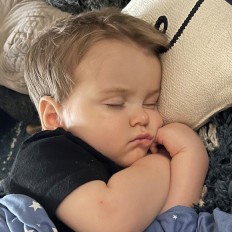Young Cancer Patient Runs Past Milestones at Texas Children’s Hospital


Topics
“It’s Mohawk Man!” exclaims pediatric neuro-oncologist Dr. Holly B. Lindsay as she opens her arms wide to greet her patient, 22-month-old Kennedy.
As chemotherapy caused the loss of his hair a few months ago, Kennedy’s charming Mohawk outwardly represents the many significant, and truly impressive, milestones he’s achieved since his diagnosis with an atypical teratoid/rhabdoid tumor (ATRT) at the age of nine months.

ATRT is a rare and aggressive infant brain tumor, and Kennedy’s Pearland pediatrician wasted no time referring his patient to Texas Children’s Hospital for highly specialized, world-class treatment.
“It’s incredible to watch Kennedy run down the sky bridge here at the hospital, especially since we didn’t even know if he’d be able to crawl when he was diagnosed,” said Kennedy’s mother, Christina. “With great treatment from his care team at Texas Children’s Cancer and Hematology Center, he amazes us as he continues to run past new milestones with regularity.”
In fact, Kennedy crawled for the first time — and took some of his first steps — at Texas Children’s, his home-away-from-home. “It’s no wonder this hospital actually feels like our second home!” Christina said.

Christina and her husband, Nate, arrived with their son at Texas Children’s Emergency Center at 3 p.m. on August 3, 2021. Following an immediate CT scan, Kennedy was in the operating room just hours later undergoing emergency surgery to drain accumulating fluid from his brain and spinal cord. Because he had a soft spot where his skull had yet to fuse due to his young age, his skull was able to expand to accommodate the growing pressure — a blessing that helped save his life. Three days later, Texas Children’s pediatric neurosurgeon Dr. Daniel Curry removed Kennedy’s tumor, located between his spinal cord and cerebellum, near his brain stem.
After healing from the surgery, Kennedy received both chemotherapy and radiation therapy. His initial radiation treatment last year was on September 1, the first day of Childhood Cancer Awareness Month. Kennedy received two cycles of regular-dose chemotherapy, followed by three rounds of very high-dose chemotherapy that required “stem cell rescue.” Stem cells are a method of replacing the blood forming stems cells that are destroyed following high dose chemotherapy.

“We used Kennedy’s own stem cells to help facilitate the chemotherapy to his brain and to ‘rescue’ him from bad infections during his treatment,” said Dr. Lindsay. “Texas Children’s is the only hospital in Houston with this capability.”
Dr. Lindsay, Associate Director of Inpatient Hematology/Oncology at Texas Children’s Cancer and Hematology Center, is one of only a dozen pediatric neuro-oncologists in the nation with expertise in treating Kennedy’s type of tumor.
“Texas Children’s is privileged in that everyone is very niched in their specialization,” said Dr. Lindsay. “Our physicians are the best in the world at what they do, and that frees us up to focus intently on specific types of cancer. When I’m on inpatient service, I see children with all types of cancer, of which I am knowledgeable. But, I also have the ability to easily consult with and refer patients to nationally renowned specialists of all types of cancer right here within our own hospital.”
Today, Kennedy’s cancer is in remission and he returns for regular check-ups with Dr. Lindsay, as well as MRIs every three months to monitor his condition.
“I tell other moms to go straight to Texas Children’s if their kids need medical care,” said Christina. “I guarantee there is someone at Texas Children’s who will know what’s going on and can help.”
Kennedy’s dad, Nate, agrees: “Without question, Texas Children’s is the most qualified hospital we could have chosen for Kennedy’s treatment. I know there is no other place he could have succeeded without the amazing team he had here. Because it’s not like he had one doctor; at Texas Children’s, he has an entire team of specialists, from physicians, to nurses, to PAs — even down to the front desk employees and housekeepers — everyone who has crossed our path has cared about Kennedy and encouraged us as a family.”
“It’s so true,” Christina added. “We’ve even become friends with folks in Transport, like Leroy! We’ll see him and say, ‘Hey, how’s it going, Leroy?’ They’ve all become part of our family.”
Dr. Lindsay notes that this level of support is essential for families battling pediatric cancer. “When a patient is diagnosed, the entire family is impacted including the siblings, parents, and grandparents,” she said. “Psychosocial support for the child and the family are essential components of our therapy.”
Nate underscores this impact: “As a parent of a cancer patient, you have to stay positive and take it slowly. Every day is a win and you have to celebrate even small wins. Kennedy is so resilient and he inspires me every day. We just take it a day at a time as a family – and that includes our extended, adopted Texas Children’s family.”
Learn more about the Brain Tumor Program at Texas Children’s Cancer and Hematology Center.
